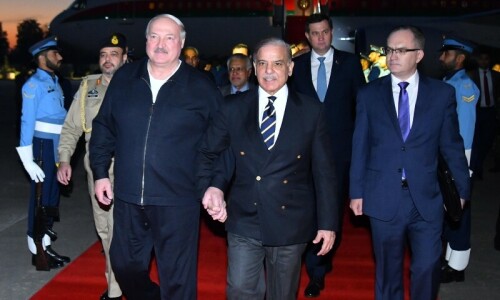REGIMES in the Middle East once considered unshakable are now fighting for survival. Amongst these is Syria, where anti-government protests are being crushed with an iron fist by Bashar Al Assad's forces. Syria has seen several incidents in the past where the state has crushed opposition groups — 1982's infamous Hama massacre springs to mind. But contrary to the past when the Assad family had managed to maintain their decades-old grip on power, matters may not go as smoothly this time. A Syrian rights group has cited a number of protes-ters being shot by security forces in different cities on Friday. On the other hand, the government has claimed that 'armed gangs' have killed several policemen. Midnight raids, in which security personnel have picked up dozens of activists, have also been reported. Details of events in Syria are hard to verify independently; already a police state, the Baathist regime has been added to the unenviable list of state press 'predators' by Reporters Without Borders, with Bahrain, Yemen and Libya also in the picture. All these Arab nations have been rocked by anti-government uprisings with the advent of the Arab Spring; their governments have cracked down with varying degrees of brutality. One thing is clear: change, when it comes, in Syria will not be without a significant number of casualties.
Some have described the Syrian set-up as a 'tribal regime' dominated by the Assad clan. Observers say that if it attempts reforms, as demanded by protesters, the system will collapse. Hence the regime will fight hard to maintain the status quo. Though many western regimes have criticised the Syrian government for its alleged human rights abuses (while offering only muted criticism of Arab allies facing similar protests), the Arab world is eerily quiet, as regimes fear that unrest in Syria will have wide-ranging repercussions in the region. Turkey feels that if Syria's Kurds make gains, its own Kurdish minority will be emboldened. In Lebanon, Hezbollah may lose a key benefactor while Iran will also lose what is probably its only major ally in the Arab world. Israel, which still occupies the Golan Heights, is also keeping an eye on Syria. The world will be watching developments in Syria very closely.










































Dear visitor, the comments section is undergoing an overhaul and will return soon.